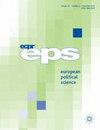在宪法中引入学术自由:一个新的全球数据集,1789-2022
IF 1.9
2区 社会学
Q2 POLITICAL SCIENCE
引用次数: 0
摘要
《宪法中的学术自由》数据集是一个新的资源,它对从1789年到2022年的203个国家的科学自由、学术自由和大学自治的宪法保障进行了实证分析。虽然在过去的十年中,学术自由的话题在政治和法律研究中越来越突出,但到目前为止,它在比较宪法文献中基本上是缺席的。然而,就其与高等教育发展的功能联系及其独特的宪法谱系而言,其全球编纂过程为研究国际规范扩散提供了有趣的见解。本文首先介绍了该数据集,并解释了它与以往编码工作的不同之处,然后讨论了它对比较法律文献、政治学和其他研究的重要性和潜在贡献。本文章由计算机程序翻译,如有差异,请以英文原文为准。
Introducing Academic Freedom in Constitutions: a new global dataset, 1789–2022
Abstract The Academic Freedom in Constitutions dataset is a new resource that empirically maps constitutional guarantees of the freedom of science, of academic freedom, and of university autonomy in 203 countries, spanning the period from 1789 to 2022. While the topic of academic freedom has been gaining increasing prominence in political and legal research over the past decade, it is so far largely absent from the comparative constitutional literature. However, its global codification process holds interesting insights for the study of international norm diffusion, both with respect to its functional connection to higher education development and its distinct constitutional genealogies. The paper first introduces the dataset and explains how it is different from previous coding efforts, before discussing its significance and potential contributions to the comparative legal literature, political science, and other research.
求助全文
通过发布文献求助,成功后即可免费获取论文全文。
去求助
来源期刊

European Political Science
POLITICAL SCIENCE-
CiteScore
3.80
自引率
20.00%
发文量
46
期刊介绍:
European Political Science (EPS) is an international journal devoted to publishing contributions by and for the political science community. Its interpretation of ''political science'' is wide and encompasses comparative politics, political economy, international relations, public administration, political theory, European studies and related disciplines. Although our traditional focus has been on European affairs and the development of the discipline, we are always on the lookout for work that compares politics in Europe with other continents and countries, and more general work (on other regions) that would be of interest to European political scientists (our main readership). As the professional journal of the European Consortium for Political Research, EPS is also a prime outlet for research notes and opinion pieces about the political science profession, including teaching and learning contributions, as well as symposia and academic debates. As a new initiative, we also publish original datasets.
The editors of European Political Science (EPS), invite you to submit the following types of articles.
Research - articles on conceptual, methodological, and theoretical developments and trends in political science. Articles aimed at this section should be intellectually stimulating, conceptually rigorous, critical and above all agenda-setting.
Profession - articles about the state of the discipline, and where it is heading, relations between academia and politicians, policy-makers, journalists and ordinary citizens.
Teaching - articles, debates and symposia on new approaches to teaching and learning political science.
Debate - a collection of 3 to 4 articles (maximum 20,000 words) that exposes two countervailing perspectives on important current affairs or professional matters in order to generate awareness and reactions from the political science community.
Symposium - a collection of 4 to 5 articles (maximum length 25,000 words) on a specific topic and under the coordination of one or two guest editors. The articles must cover either research matters (including the discipline, methodological and conceptual developments, as well as research findings in the classical sense that may contribute to an advancement of the discipline). Symposia can also tackle professional matters (such as career structures and prospects, external evaluation, higher education reforms, accreditation issues, funding trends).
Datasets - original dataset accompanied by a short explanatory note explaining the dataset, its novelty, the variables included and the data sources. The descriptive piece will be under copyright, but not the dataset. This format allows authors to get their dataset published and cited, but also allows them and others them and others to use the data for research articles.
 求助内容:
求助内容: 应助结果提醒方式:
应助结果提醒方式:


